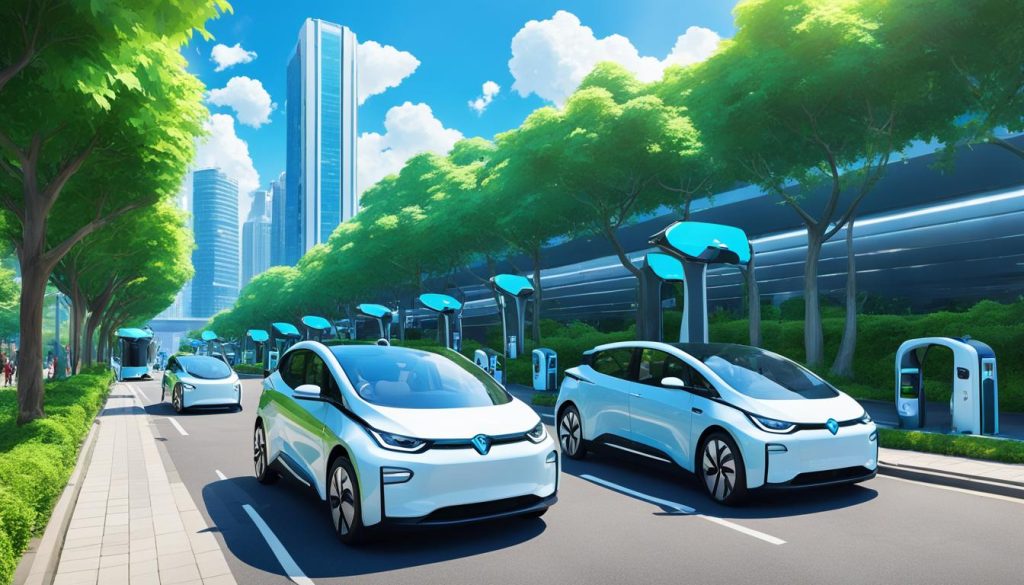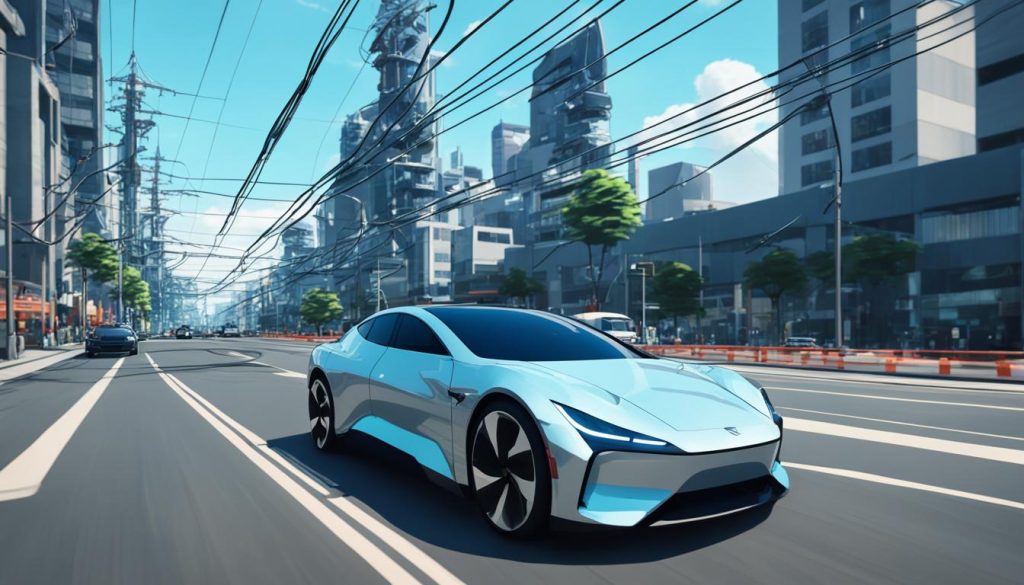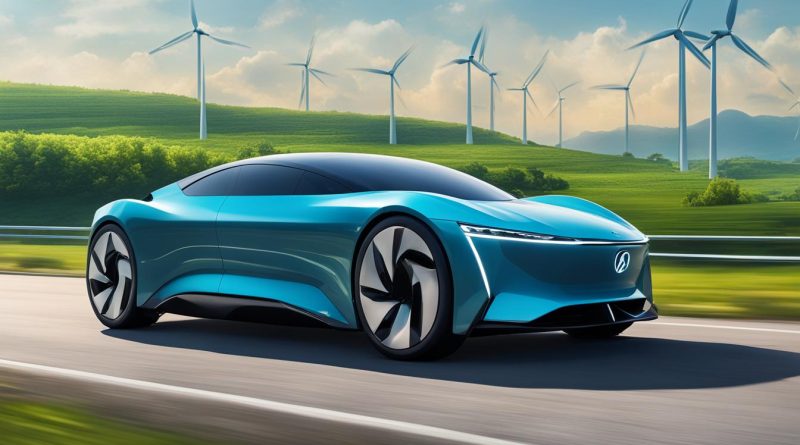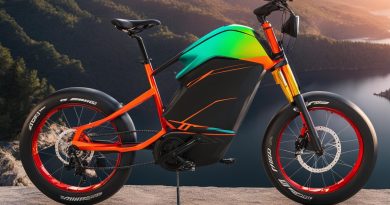Electric Vehicles: Future of Sustainable Transport
Electric vehicles (EVs) have become an increasingly popular mode of transportation in recent years. EVs are vehicles that run on electric motors, powered by rechargeable batteries, rather than internal combustion engines that require fossil fuels. Sustainable transportation that ensures minimal environmental impact is crucial in reducing emissions and achieving a greener future.
EVs are a viable alternative to traditional petrol or diesel vehicles, as they offer numerous benefits such as fuel efficiency, lower operating costs, and reduced carbon emissions. In this section, we will delve into the pivotal role of EVs in advancing sustainable transportation, the benefits of EVs, their impact on the environment, and how they are shaping a greener future for transportation.
Key Takeaways:
- EVs are a viable alternative to traditional petrol or diesel vehicles in terms of fuel efficiency and lower operating costs.
- EVs have a lower carbon footprint and are vital in reducing emissions for a greener future.
- EVs are shaping a greener future for transportation and paving the way for growth in the electric industry.
- The rise in EVs impacts the demand for electricians and electrical services, presenting opportunities for growth in the electrical industry.
- As the world embraces EVs, the future of sustainable transportation looks promising.
The Advantages of Electric Vehicles
Electric vehicles (EVs) are becoming increasingly popular, and for a good reason. Here are some of the advantages of using EVs:
Electric Power – A Cleaner Energy Source
EVs utilize electricity as their power source, which makes them a cleaner alternative to traditional fuel vehicles. They produce fewer emissions, improving air quality and reducing the carbon footprint. This means EVs play an important role in reducing the impact of transport on the environment and are a vital component of a greener future.

Less Maintenance
Compared to traditional combustion engine vehicles, EVs have fewer moving parts. This means there is less wear and tear, and therefore less maintenance is required to keep an EV in good condition. An EV’s lower maintenance requirements make it a more cost-effective option in the long run.
Efficiency and Performance
EVs offer high energy efficiency, which means a smaller amount of energy is lost during driving compared to traditional vehicles. This effectively means they can travel further on a single charge. Additionally, electric motors offer instant torque, which provides rapid acceleration and superior performance, making EVs a fun and exciting way to travel.
Economic Benefits
EVs have a lower operating and maintenance cost compared to traditional vehicles. Firstly, the cost of electricity is lower than gasoline, making running costs cheaper. Secondly, since EVs have fewer moving parts, they require less maintenance, reducing service costs significantly. They are also eligible for various incentives such as lower tax rates, subsidies and toll discounts.
“The advantages of using EVs are environmental benefits, high energy efficiency and lower operating cost.”
Electric Vehicles and the Electrical Industry
The adoption of electric vehicles is not only reshaping the transportation industry but also impacting the electrical industry. As electric vehicles require electrical charging stations, it is accelerating the demand for electricians and electrical services. Moreover, it presents new opportunities for growth in the electric industry.
Electrician: A professional who installs, maintains and repairs electrical systems.
With the rise of electric vehicles, traditional gas stations are giving way to electrical charging stations. As a result, the installation of these charging stations requires skilled electricians. They are responsible for the installation of electrical equipment necessary to charge electric vehicles. Hence, the demand for electricians has increased in recent years.

The emergence of electric vehicles has also created new opportunities for growth in the electric industry. As more people adopt electric vehicles, the demand for the installation of charging stations and other electrical infrastructure will rise. This will require new technologies and solutions to meet the demand for electrical power. Hence, the electric industry is poised to grow thanks to electric vehicles.
Conclusion
In conclusion, electric vehicles are paving the way for a more sustainable future in transportation. With their lower carbon emissions and utilization of electricity as a power source, they offer a greener alternative to traditional petrol and diesel vehicles.
The impact of electric vehicles extends beyond the environment, as their rise also presents opportunities for growth in the electric industry and demand for skilled electricians.
As more individuals and businesses embrace electric vehicles, the future of sustainable transport looks promising. Their benefits are clear and their potential for contributing to a greener future is immense.
In short, electric vehicles are not just a trend but are here to stay, and they have the potential to shape a better and more sustainable world.
FAQ
What are the benefits of electric vehicles?
Electric vehicles offer several benefits, including reduced carbon emissions, lower fuel costs, and quieter operation. They also contribute to a greener future by reducing dependence on fossil fuels and promoting sustainable transportation.
How do electric vehicles utilize electricity as a power source?
Electric vehicles use electricity stored in rechargeable batteries as their primary power source. These batteries are charged by connecting the vehicle to an electric power source, such as a charging station or home charging unit.
How are electric vehicles impacting the electrical industry?
The growing popularity of electric vehicles is increasing the demand for electricians and electrical services. Electricians are needed to install and maintain the charging infrastructure, as well as handle any electrical wiring or upgrades required for electric vehicle owners.
How do electric vehicles contribute to a greener future?
Electric vehicles produce zero tailpipe emissions, unlike traditional internal combustion engines that emit greenhouse gases and pollutants. By transitioning to electric vehicles, we can reduce air pollution and combat climate change, ultimately leading to a greener and more sustainable future.




